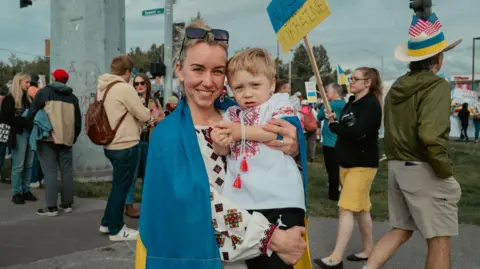The recent geopolitical tensions have taken an unexpected twist as Alaska becomes a focal point for discussions between world leaders. Anchorage, the capital city, is buzzing with the impending arrival of significant figures such as US President Donald Trump and Russian President Vladimir Putin. This has stirred a mix of emotions among locals, resonating particularly strongly with those of Ukrainian heritage like Hanna Correa. Correa, who emigrated from Ukraine in 2019, poignantly expresses her disappointment, noting, “Putin is supposed to be in jail, and he just comes to Alaska like that.” Surrounded by other Alaskans wielding Ukrainian flags, her emotional response illustrates the frustration felt by many regarding the situation in her home country, currently embroiled in conflict.
In a striking juxtaposition, while some locals like Ms. Correa show their solidarity with Ukraine, there are also voices like that of Christopher Kelliher, a military veteran and native Alaskan. Kelliher shares his disdain for the leaders’ forthcoming meeting in his home state, stating, “Putin doesn’t need to be in our state, much less our country.” His comments reflect the sentiment of discomfort many feel about the perceived toleration of a leader who is associated with aggressive military actions abroad. This tension underscores a broader unease regarding international relations, especially as many Alaskans feel more directly affected by these dynamics due to their geographical proximity to Russia.
Indeed, the summit in Alaska carries historical significance. The purchase of Alaska from Russia in 1867 for a meager sum of $7.2 million is often derided as “Seward’s Folly.” However, the region later revealed a wealth of resources, shifting public perception. In Anchorage, the echo of the region’s Russian heritage is prominent. The ornate churches, like the St Tikhon Orthodox Church, serve as poignant reminders of a shared past. During this period leading up to the summit, this church has organized three days of prayer, highlighting the emotional weight of the conflict on locals and emphasizing the hope for a peaceful resolution that many there seek.
Among the protests and prayer vigils, fishermen in the outskirts of Anchorage are drawn to the tranquil beauty of their surroundings. One fisherman, Don Cressley, expresses his desire for peace in Ukraine, lamenting the war’s impact on civilians. His support for Trump’s negotiation efforts adds to the complex array of beliefs held by those in Alaska regarding the meeting. Cressley’s comments reveal that while the ongoing conflict has sparked concerns about the humanitarian consequences, some residents are also supportive of the current leadership’s approach.
The sense of geopolitical tension in Alaska is palpable, particularly given the heightened military presence from Russia near the state’s border. Anchorage resident Russell Wilson articulates this unease, “If the president doesn’t put the hammer down, we could be the next Ukraine.” His words echo the concerns of many Alaskans who observe the historical patterns of military posturing between the two countries. Interestingly, responses to these tensions vary widely across the community. While some residents fear a return to Cold War hostilities, others like fellow veteran Kelliher dismiss invasion concerns, pointing out that “everybody in Alaska owns a gun,” highlighting a common feeling of preparedness.
Ultimately, the local perspective in Alaska regarding the unfolding geopolitical circus is multifaceted, embodying a rich tapestry of historical influence, personal connection to the crises at hand, and varying outlooks on international relations. The upcoming discussions between Trump and Putin in Anchorage underscore not only the immediate political significance of their meeting but also how closely it intertwines with the lives of ordinary Alaskans. As the world watches, the state’s residents grapple with the implications of these high-stakes summits on their communities and the very fabric of their historical narratives.












